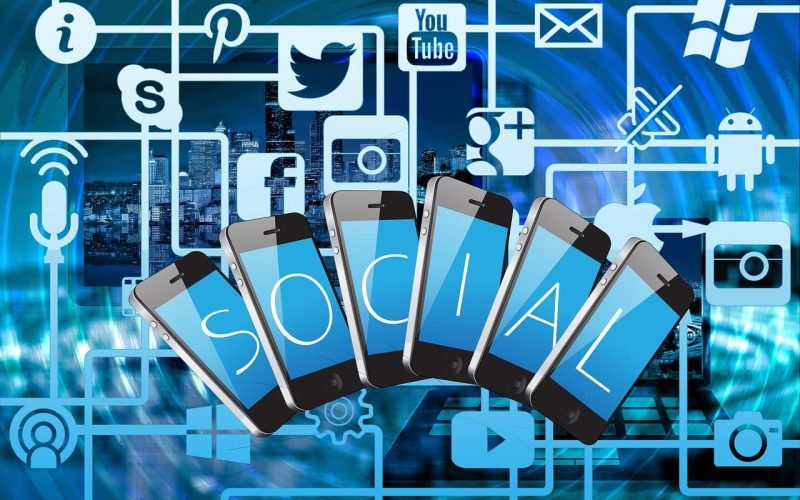Social media has become a part of our lives. Whether it’s Facebook, Twitter, or Instagram, social media platforms play a significant role in our day-to-day lives.
After a stressful day’s work, the content we see on social media helps us cool off our brains and makes us feel better.
However, everything with a benefit comes with a drawback. So, follow us as we discuss the pros and cons of social media.
What is Social Media?
Social media is an online platform that allows users to share their thoughts, ideas, and opinions through various media, such as text, images, videos, audio files, etc.
It also provides a way for people to interact with each other by posting comments, liking posts, sharing photos, and more.
Famous social media sites include Instagram, Twitter, Facebook, Tumblr, etc.
Pros of Social Media
1. Easy Connection Worldwide
One of the most significant advantages of using social media sites is their ability to connect people worldwide.
You can easily find someone who shares your interests and hobbies just by searching for them on Google.
For example, if you’re looking for a new place, you can search for “best places to visit” on Google and get suggestions based on what others have said about those places.
Social media users can make several friends across the world. If you want to meet new people, you don’t need to leave your house; you only need to log into your favorite social media website and start chatting with strangers.
2. Easier and Faster Communication
Social media has made communication more accessible than ever before; one of the notable pros of social media is.
With a few clicks, you can send messages to anyone around the globe. You can even use social media websites to create groups to chat with your friends at once.
This means you no longer need to wait until everyone gets home from work to talk to them. You can also use social media sites to keep up with your family members.
You can also post pictures of your kids’ birthday parties, ask questions about their school projects, and receive updates about their activities.
3. More Opportunities
One of the pros of social media platforms is that they allow you to do things you couldn’t do before. For instance, you can now apply for jobs without leaving your house.
All you need to do is go to social media sites like LinkedIn, fill out your profile, upload some samples of your work, and submit your application.
You can look for articles online to learn how to write a resume. Many helpful tips and tricks are available there.
4. Fun
Using social networking sites doesn’t always mean being serious. Some people like to joke around while they’re on social media.
They may post funny memes, jokes, or quotes on their pages, while others may want to watch cat videos.
All you need to do is find what interests you the most and follow those pages.
5. Visibility
Visibility is also among the pros and cons of social media. Social networking sites allow you to build your brand, reach people, and gain attention.
You no longer need to go begging to newspapers, magazines, radio stations, television networks, etc., for exposure.
Today, anyone can publish anything online, and it costs nothing. These social media posts open opportunities for talents to showcase their talents and earn money from doing what they love.
If you want to start a blog about writing, photography, or video editing, you don’t need to buy a domain name.
There are many free ones, like Blogger.com, Tumblr.com, and Squarespace.com. These platforms give you everything you need to set up shop, post content, and promote your site.
You can also use social media marketing to find clients and customers. Facebook is an excellent social platform for this because it allows you to target specific demographics.
6. Access to Social Groups
Another advantage of social media is that it gives you access to many social groups, including millions of people.
For example, you can join groups related to your interests, such as music, movies, TV shows, books, games, sports, politics, religion, and so much more.
These groups will help you stay updated with current events on these topics. You’ll also be able to share ideas, opinions, and information with like-minded people.
7. Free Advertising
Among the significant pros of social media platforms is the access to free advertisements, known as digital marketing.
With social media marketing, you can advertise your products and services through social media if you have a business.
For example, if you own a restaurant, you can post photos of your food on Instagram, Twitter, and Facebook.
People who visit your page can then see your menu, read reviews, and even order takeout.
However, you can decide to advertise with some money. This way, you can get more targeted results through social media campaigns.
8. Crowdsourcing
Crowdsourcing is an outsourcing strategy where companies hire freelancers to complete tasks.
This method is used widely across industries, especially those that require expertise or resources that are difficult to find.
An excellent example of crowdsourcing is Wikipedia, where anyone can contribute articles about anything.
Another example is the crowd-funding campaign, where people raise money for specific projects.
The term originated in the early 1990s when it referred to small groups collaborating over e-mail lists to complete tasks.
However, today, crowdsourcing encompasses many forms of collaboration, including open-source software development, peer production, and independent journalism.
In recent times, crowdsourcing has gained popularity in the startup world. Entrepreneurs use it to finance their businesses.
They post a project on a website, solicit contributions from interested parties, and then award the funds based on how much support they receive. All these wouldn’t have been so easy without social networks.
Cons of Social Media
As promised, we’ll discuss the pros and cons of social media. While we have given a detailed explanation of the pros, let’s also consider the cons.
1. Zero Privacy
Online privacy is a hot topic these days. People are concerned about what information is being collected, how it’s used, and whether it’s safe.
And while some people think there’s nothing you can do about it, there are ways to protect yourself.
The problem isn’t just limited to Facebook, Twitter, Instagram, etc., either.
If you use a smartphone, chances are pretty good that one of those apps collects information about where you go and what you do.
Even if you don’t use such apps, plenty of companies collect information about us without our knowledge.
The issue is that we’re giving away a lot of personal data for free. We’re letting people know where we live, where we work, what we buy, who we hang out with, and even what we post online.
This information can be used against us in many different ways.
2. Overuse
Social media can become addictive, leading to overuse of the platforms, which is one of the cons of social media.
It’s not uncommon for people to spend hours every day checking their feeds. In fact, according to a study, most check their newsfeed at least once per hour.
This means that people spend too much time examining other people’s lives instead of focusing on themselves. The result? Many people feel lonely and depressed.
3. Cyberbullying
Bullying is unacceptable because it could lead to low self-esteem, depression, and other adverse effects.
However, cyberbullying is worse than traditional bullying because it doesn’t involve physical contact.
It also happens 24/7, making it harder to escape. Plus, bullies tend to target people they perceive as weak, meaning that kids who are overweight, disabled, or unpopular are often victims.
Cyberbullying isn’t limited to text messages and Facebook posts; it can include anything from posting embarrassing photos online to spreading rumors and lies.
While it’s difficult to determine whether cyberbullying leads to real-world consequences such as dropping out of school or engaging in self-destructive behaviors, mental health has clear implications.
A recent study found that cyberbullying increases the risk of developing symptoms of depression and anxiety.
4. False Expectations
Social media platforms are great tools for building relationships and connecting with people around the globe.
But sometimes, people believe everything is going well with people posting nice pictures or sharing funny videos.
They assume everyone else is having fun when they feel down or stressed out. So, they start comparing themselves to others and get upset when they realize they aren’t living up to expectations.
5. Reduces Productivity
One of social media’s cons is that it affects productivity. When people constantly check their phones, they miss important things like meetings and deadlines.
They also have trouble concentrating and focusing on tasks. Notifications catch our attention and make us feel important. But it turns out they’re killing productivity.
Many people say they want to reduce their notifications, but they get overwhelmed by them anyway. They become obsessed with checking every single one, eventually giving up.
6. Fraud
As the world becomes increasingly interconnected via social networks, it’s no surprise that scammers are lurking around every corner.
In fact, according to research, cybercriminals use Twitter to spread malware, phishing scams, and spam.
And while most people think that the primary source of threats comes from malicious software, the truth is that social engineering attacks are becoming more common.
There’s even a term for it: “social hacking.” This refers to online tricks where crooks try to trick victims into giving away personal information, such as passwords and credit card numbers.
Hackers usually carry out these attacks through emails, text messages, instant messaging apps, phone calls, chats, and social networking sites.
And while many people assume that social media platforms like Facebook, Instagram, LinkedIn, and others are safe places, that’s far from true.
Hackers can easily access your profile and steal your identity. They can also use your name and photo to impersonate you on third-party websites.
For instance, criminals could set up a fake Facebook page under your name and post messages about themselves. Or they could post photos of you on another site, pretending to be you.
Conclusion
We hope you have grabbed some points from the pros and cons of social media discussed in this article.
So, if you join any social network, remember to protect yourself by following best practices. Also, don’t forget to delete old accounts once you’re done with them.








